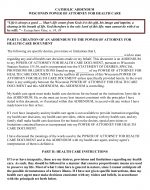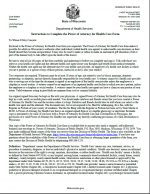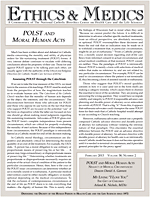
A “Compromise” To POLST … Without Compromise
-
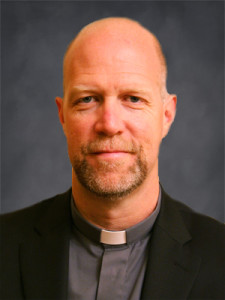
Deacon Dan Gannon - In February of 2013, I authored an article in Ethics & Medics evaluating the morality of POLST in light of how the Church analyzes the moral act. In essence, I noted that the POLST paradigm is intrinsically flawed as a Catholic approach to end of life decision-making and that Catholics should not use such forms. This view is consistent with the Minnesota[1] and Wisconsin[2] Catholic Conferences, as well as the Catholic Medical Association Lincare Quarterly white paper on the POLST paradigm.[3] From a Catholic perspective, a morally sound decision regarding end-of-life care flows from informed consent in actual circumstances and in the actual medical conditions of that moment. The Church teaches that one is obligated to use proportionate means of preserving their life, but may forgo disproportionate means of preserving life.[4] Determining whether treatments are proportionate or disproportionate necessarily requires an analysis of the actual clinical condition of the patient in the particular circumstances. POLST’s problem is that it specifies binding medical orders at a point in time, regarding the withholding of treatments in the future, some of which depend on a real-time assessment of the patient’s condition to be ethical.
It seems many Catholic ethicists and bishops do not yet grasp this fundamental defect in the POLST model and the moral implications and risks of using this form. POLST has continued to emerge, with various levels of development in over 40 states.[5] Yet, the phenomenon is still largely unfamiliar to most bishops. As a result, many Catholic health care providers have been utilizing POLST for a long time now, within the framework of the local health care systems, often assuring the few inquiring ethicists and bishops that they will “use” the forms in a manner consistent with Catholic ethics.[6] Of course, in Wisconsin and Minnesota, there is excellent direction given by the conferences of bishops outlining the problems with POLST. It would be good to see additional state conferences of bishops and the USCCB take up the POLST issue, so there can be appropriate consistency and analysis of the problems surrounding it. There is great pressure in Catholic health care to balance efficiencies and comity with local or regional secular health systems, while (at varying levels of intensity) attempting to maintain Catholic identity and adherence to the Ethical & Religious Directives.
Where do we go from here?
One challenge for bishops and ethicists grappling with POLST is to address how exactly Catholic health care providers should respond in a manner consistent with Catholic ethics. In many states, there is still limited knowledge and direction available as the POLST paradigm develops in those states and local churches. In any case, a framework is necessary for regular dialogue and direction between bishops and the Catholic health care facilities in their diocese, in order to work through the proper response to POLST and the issues that must be addressed. But what should that response be?
It should also be reiterated and reinforced in dioceses that the best approach to end of life decisions is to use power of attorney for health care and advance directives. However, in its prevalent iteration, POLST behaves like an overly specific advance directive, which also binds as a medical order, because it includes treatment options, such as the withholding of ANH and antibiotics, levels of care, etc., which are not necessary or appropriate for emergency medical orders. POLST thus commits a category mistake by attempting to designate treatments that require ethical judgments, which take patient pathologies and circumstances into account. The proper ethical mechanisms for addressing such treatments are the advance directive and power of attorney for health care, where a physician’s assessment of health condition and prognosis in that moment can occur and a determination of proportionality or disproportionality can be made according to the ERD.[7] It is precisely because EMS personnel are not able to make such decisions and diagnosis that makes treatment options in POLST beyond a DNR/DNI inappropriate, medically and ethically. POLST blurs distinctions between emergency medical orders and advance directives / power of attorney by ordering treatments which ethically and medically require assessment of whether those treatments are proportionate or disproportionate. POLST prescinds the circumstances, opening the door to euthanasia by omission.
However, POLST advocates usually assert the POLST form is not intended to be a replacement for an advance directive or power of attorney, but rather provide for situations where patients may be in need of emergency medical services. This would seem to be a legitimate goal. In such situations, EMS personnel require something very clear and binding as a medical order. What does Catholic teaching allow in this regard? POLST supporters often argue that it is intended to provide certitude and clarity to emergency responders and can effectively address situations where the patient may otherwise receive “overtreatment”.
This raises the question: Is there an emergency medical order that could be issued for such situations that is consistent with Catholic moral teaching? I think so.
A “Compromise” Without Compromise
Perhaps there is a “compromise” regarding POLST, which does not require any compromise in Catholic ethical teaching and also addresses the overarching concerns of those who advocate POLST as a solution to emergency medical situations. Such a “compromise” is the reformulation of POLST into an outpatient Do Not Resuscitate/Do Not Intubate (DNR/DNI) medical order. I say “compromise” in the sense that DNR/DNI are part of POLST already in various ways. I say “without compromise” in the sense that the other treatment orders in POLST still need to disappear, because they are not needed in emergency responder circumstances and they require real time assessment and conversation involving the physician and proxy agent to determine whether withholding or removing those treatments is consistent with the ERD in that particular case.
Seminal to this position is that POLST emergency medical orders need nothing further than a DNR/DNI. There are really only two scenarios in which emergency response teams cannot practically conduct a real time conversation to discern if a patient wants to defer, (or whether it is ethical to defer) intervention; these two scenarios are cardiac arrest and respiratory failure. All other treatments and decisions should flow from “real time conversation” – viz. in the moment decision-making. Such is the purview of the durable power of attorney for health care and advance directive. Thus, we have a complementary solution, which addresses the procedures of DNR/DNI and can be determined ethically at a certain point in time in a person’s life, while leaving the rest to power of attorney and advance directives. It should be emphasized that the analysis of whether one should have a DNR/DNI medical order created must be subject to Catholic moral teaching and the ERD.[8]
Is such a document a “Catholic POLST”? It is indeed a physician’s order regarding life-sustaining treatment. Is it POLST as we know it? Definitely not. It is far simpler and narrower, but it does carefully carve out a component that POLST typically addresses in “section A” and perhaps some of “section B” of most POLST forms. It may be imprudent to call this a “Catholic POLST”, because it suggests that POLST as people have known it to this point, is somehow morally acceptable. That being said, I’ll leave aside what it is called for the moment.[9] This document could be cast in the same color and grade of paper as POLST, consistent with the practices in the local health system and community, so the EMS personnel will recognize the medical order when responding to someone’s home, apartment or nursing home. The patient and physician, ensuring informed consent and the required authorization for EMS personnel to act with confidence and clarity, would sign the form. I would also suggest that in such emergency situations, simpler is better.
The much-simplified DNR/DNI medical order effectuates the proper scope of ethical decision making in the limited, emergency circumstances without ambiguity, placing emphasis back on to the durable power of attorney and advance directives. The DNR/DNI order solution effectively addresses the major goal of POLST – viz. where very fragile older adults with serious medical conditions may rightly desire to decline resuscitation. The proposition that emergency orders need nothing further than a DNR/DNI medical order, is still consistent with the Catholic ethical position that the remaining sections of POLST are unnecessary at best, and continue to pose a very dangerous and false paradigm for end of life decision-making.
[1] “A Pastoral Statement on Physician Orders for Life-Sustaining Treatment (POLST),” Minnesota Catholic Conference, <http://www.mncc.org/stewards-of-the-gift-of-life/>.
[2] “Upholding the Dignity of Human Life A Pastoral Statement on Physician Orders for Life-Sustaining Treatment (POLST) from the Catholic Bishops of Wisconsin,” Wisconsin Catholic Conference, July 2012, <http://wicatholic.wpengine.com/wp-content/uploads/2019/04/Catholic_Addendum_to_Power_of_Attorney_for_Health_Care_08-2014_-_FINAL.pdf>.
[3] Christian Brugger, Louis C. Breschi, Edith Mary Hart, Mark Kummer, John I. Lane, Peter T. Morrow, Franklin L. Smith, William L. Toffler, Marisa Beffel, John F. Brehany, Sara Buscher, and Rita L. Marker, “The POLST Paradigm and Form: Facts and Analysis.” The Linacre Quarterly, 80.2 (2013): 103-38. 2013 <http://cathmed.org/assets/files/LNQ59%20FINAL.pdf>.
[4] Cf. Cf. U.S. Conference of Catholic Bishops, Ethical and Religious Directives for Catholic Health Care Services, 5th ed. (Washington, DC: USCCB, 2009), nn. 56, 57.
[5] “Programs in Your State,” Physician Orders for Life Sustaining Treatment Paradigm. National POLST Paradigm, Accessed 30 May 2014 <http://www.polst.org/programs-in-your-state/>.
[6] I addressed the “use” of POLST argument in my previous Ethics & Medics article dated February 2012.
[7] Note that guiding principles, consistent with the ERD, and not specific treatments, should be emphasized in advance directives.
[8] Cf. USCCB, Ethical and Religious Directives, n. 56. DNR/DNI orders can be consistent with Catholic moral teaching if it is determined, consistent with ERD 56, that CPR would be disproportionate because they are determined to not offer the patient a “… reasonable hope of benefit or entail an excessive burden…”
[9] I think “Outpatient Medical order for DNR/DNI” is a reasonably accurate description.
- Catholic Addendum Wisconsin Power of Attorney for Health Care
Page 3 of 4 This ADDENDUM, as incorporated into my POWER OF ATTORNEY FOR HEALTH CARE DOCUMENT, completes my health care directive. PART III: MAKING THE DOCUMENT LEGAL
- Power of Attorney Health Care Form
DEPARTMENT OF HEALTH SERVICES Division of Public Health F-00085 (Rev. 06/11) STATE OF WISCONSIN Chapter 155.30(1),(3) Effective Date August 3, 2009
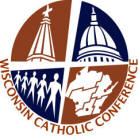
Vital Conversations for Families
Bishop Callahan has asked that all parishes in the Diocese of La Crosse be offered educational information on the Church’s teachings on the Stewardship of Goods and the Gift of Life.
“Vital Conversations” is a two part presentation for Families developed by Attorney’s working in family law and estate planning and Catholic Hospital Pastoral Care Staff in collaboration with the Office of Marriage and Family Life addressing issues which are often left unaddressed by families.
Part 1 includes an Overview of the Catholic Church Teachings on the Gifts of the Earth and the practical issues around Estate Planning and Durable Power of Attorney.
Part 2 includes an Overview of the Catholic Church Teachings on the Gift of Life and the Dignity of the Human Being and the practical issues around the Durable Power of Attorney for Healthcare and Advance Directives. It concludes with a presentation entitled “Communicating with my Family”.
- Now and at the Hour of Our Death
A Pastoral letter from the Roman Catholic Bishops of Wisconsin on End of Life Issues, Revised May 29, 2013 - USCCB site on End of Life Issues
- Ethical and Religious Directives for Catholic Health Care Services, Fifth Edition
- Artificial Nutrition and Hydration – Vatican Response (2007)
- Charter for Health Care Workers (1995)
- A Catholic Guide to End of Life Decisions

